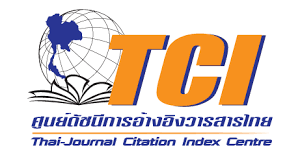A Study of Flexible Supply Chain Practices to Business Performance: Thai Automotive-Part Manufacturing Group
Keywords:
Flexible Supply Chain,, Thai Automotive-Part ManufacturersAbstract
The purpose of this research is to investigate level of activities based on operations under Flexible Supply Chain Management in automotive-part manufacturers and relationship of operations against their business performances. A survey-based research approach is used as a method of study. The result of this research showed that the group of manufacturers emphasize on three areas of practices which are customer’s requirement comprehension, customer relationship improvement and pull-based production system. For correlation analysis, inventory reduction and supplier relation improvement have relation to business performances with statistically significant. It presented that when the levels of implementing the two practices are high, the indicators of companies’ performances are low. It is noted that the result of the study will guide the direction for planning and reviewing flexible supply chain of automotive-part manufacturers in order to efficiently improve their operations within supply chain.
References
[2] D. Fliedner and R. J. Vokurka, “Agility: Competitive Weapon of the 1990s and Beyond?,” Journal of Production and Inventory Management, vol. 38, 1997, pp. 19-24.
[3] W. J. Tolone, “Virtual Situation Rooms: Connecting People Across Enterprises in the Supply Chain Agility,” Computer Aided Design, vol. 32, 2000, pp. 109-117.
[4] A. Agarwal, R. Shankar and M.K. Tiwari, “Model Agility of Supply Chain,” Journal of Industrial Marketing Management, vol.36, 2006, pp. 443-457.
[5] R. Shah, and P. T. Ward, "Defining and Developing Measures of Lean Production," Journal of Operations Management, vol. in Press, Corrected Proof, 2007.
[6] V. Crute, "Implementing Lean in Aerospace-Challenging the Assumptions and Understanding the Challenges," Technovation, vol. 23, 2003, pp. 917-928.
[7] R. Garber and S. Sarker, "Want a More Flexible," Journal of Supply Chain Management Review, 2007, pp. 29-33.
[8] K. C. Tan, S. B. Lyman and J. D.Wisner, "Supply Chain Management A Strategic Perspective," International Journal of Operations & Production Management, vol. 22, 2002, pp. 614 - 631.
[9] ตรีทศ เหล่าศิริหงษ์ทอง ลลิดา ยิ่งสูง และทศพล เกียรติเจริญผล. “การประยุกต์ใช้ระบบการผลิตแบบลีนร่วมกับการจัดการแบบโซ่อุปทาน.” วิศวลาดกระบังสาร. ปีที่ 25 ฉบับที่ 1. 2551. หน้า 52-57.
[10] T. Kiatcharoenpol, K. Rohitratana and T. Laosirihongthong, “Operation Strategies and Performance: Empirical Study of the Thai Automotive Industry” 3rd World Conference on Production and Operations Management (POM 2008), Japan, Aug 5-8, 2008, pp. 66-74.
[11] J. C. Nunnally, Psychometric Theory, New York: McGraw-Hill, 1978.
Downloads
Published
How to Cite
Issue
Section
License

This work is licensed under a Creative Commons Attribution-NonCommercial-NoDerivatives 4.0 International License.
The published articles are copyrighted by the School of Engineering, King Mongkut's Institute of Technology Ladkrabang.
The statements contained in each article in this academic journal are the personal opinions of each author and are not related to King Mongkut's Institute of Technology Ladkrabang and other faculty members in the institute.
Responsibility for all elements of each article belongs to each author; If there are any mistakes, each author is solely responsible for his own articles.






